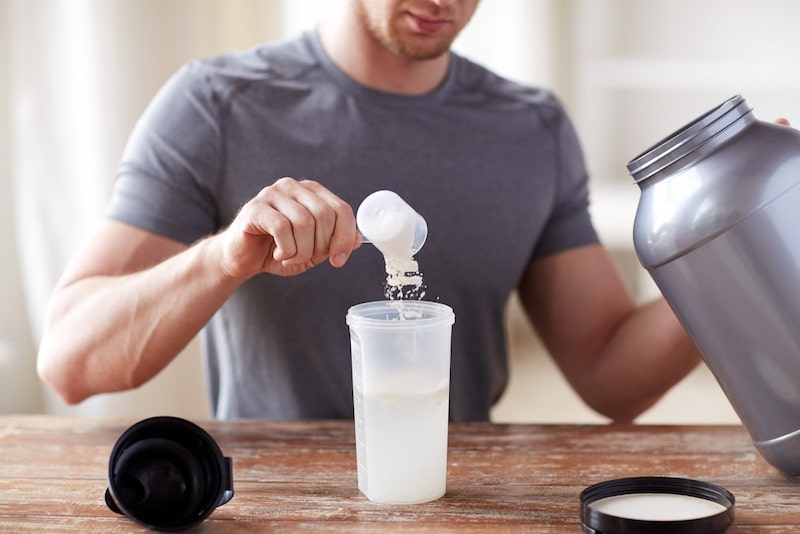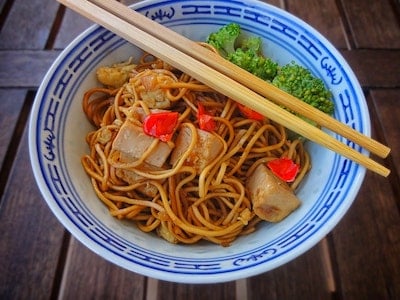Vegetarian Substitute for Whey Protein: What Can You Eat Instead?
Adding whey protein to your diet is an effective and affordable way to increase strength and improve athletic performance.
However, this helpful supplement is not an option for vegetarians, as it’s derived from cow’s milk. The good news is that there are several excellent plant-based protein alternatives.
If you’re looking for a more affordable option, powders derived from grains and legumes might be your go-to choice.
Powders made from seeds might be more expensive, but they’re an excellent vegetarian substitute for whey protein.
If, however, you’re swearing off powders altogether, you should consider egg whites.
Keep reading to learn all your options and choose the best one for you.

Why Choose a Vegetarian Substitute for Whey Protein?
Although whey protein production doesn’t involve animal slaughter, it involves factory farming.
Many vegetarians consider factory farming animal cruelty due to the harmful practices of extreme confinement and inhumane treatment.
Apart from harming the animals, factory farming causes significant damage to the environment and the rural communities.
However, a vegetarian lifestyle isn’t the only reason you might want to avoid using whey protein.
People who are lactose intolerant will also rejoice at the possibility of successfully replacing whey protein with a dairy-free alternative.
What Is a Good Vegetarian Substitute for Whey Protein?
Many manufacturers strive to accommodate different lifestyles and dietary restrictions, so a worthy vegetarian substitute for whey protein is easy to find.
You can find plant-based protein powders derived from several types of plants, most commonly pea, hemp, and soy.
Whey protein contains all nine essential amino acids, making it a complete protein.
Unfortunately, plant-based options are typically not a complete protein, with soy protein as the only exception.
So, if you’re looking to build muscles, you should go for soy protein or a combination of multiple plant proteins.
To reap all the benefits of whey protein, look for plant-based powders with similar protein content. On average, a serving of whey protein contains 20 to 30 grams of protein.
By swapping out whey protein, vegetarians can maintain their lifestyle and stick to their beliefs without their diet or exercise regimen taking a hit.
Luckily, it’s easier to find vegetarian alternatives for whey protein compared to foods like steak and fish. Let’s take a look at my recommended vegetarian substitutes for whey protein.
Pea Protein
Pea protein is made from yellow split peas due to their significantly higher protein content than the sweet green pea variant.
A single serving packs about 21 grams of protein, making it an excellent vegetarian substitute for whey protein.
When it comes to the essential amino acids, legumes are typically low in methionine but rich in leucine, valine, and isoleucine.
A pea protein is no different. Thanks to its content, pea protein is equally as adequate as whey protein for gaining muscles.
Soy Protein
Soy protein powder is the only complete protein among the vegetarian alternatives for whey protein.
In addition, its high leucine, valine, and isoleucine content make it beneficial for muscle growth and strength.
Typically, a soy protein isolate powder serving will add around 22 grams of protein to your meal. This makes it one of the highest protein contents on our list.
To enjoy the benefits of soy protein without any adverse health impacts, look for brands that don’t use genetically modified soy.
Brown Rice Protein
Brown rice protein serves as a great vegetarian substitute for whey protein, as it’s relatively inexpensive and easy to find.
By adding a serving of brown rice protein to your favorite smoothie, you’ll consume around 22 grams of protein. In addition, this powder is an excellent source of branched-chain amino acids.
These amino acids fuel working muscles and stimulate muscle growth, and will effortlessly take whey protein’s place in weight training diets.
One important aspect to note is that brown rice protein may contain high levels of arsenic, which is a highly toxic element.
So, when looking for this product, make sure that the brand you’re interested in tests for arsenic levels.
Pumpkin Seed Protein
Pumpkin seeds are relatively high in protein and calories due to their healthy fat content.
However, when they’re transformed into powder, most fat is taken out, thus reducing calories.
A pumpkin seed protein serving contains 18 grams of protein and high amounts of iron, zinc, magnesium, and other vital minerals.
Hemp Protein
Hemp protein is derived from the seeds of cannabis plants that only contain trace amounts of THC.
Depending on the brand, a hemp protein serving usually provides around 12 grams of protein.
However, what it lacks in protein content, hemp protein makes up for in nutrient content. Namely, this plant-based powder is packed with fiber, iron, magnesium, and zinc.
Additionally, powders made from seeds are low in lysine.
So, when consuming hemp protein, you should include legumes or quinoa in your diet to make up for the lack of this essential amino acid.
Sacha Inchi Protein
This protein powder is derived from sacha inchi seed.
Originating in Peru, this ingredient isn’t widely available, so the sacha inchi protein powder costs more than common proteins.
You’re paying for around 17 grams of protein per serving when buying this powder. However, it’s an excellent source of all amino acids except lysine.
Out of all the amino acids, it’s especially rich in arginine, which leads to improved circulation and lower blood pressure.
Egg Whites
I can’t talk about an efficient vegetarian substitute for whey protein without mentioning egg whites.
In fact, these two ingredients are among the most beneficial protein sources for building and maintaining muscles.
Like whey protein, egg whites are also a complete source of protein, thus beating most plant-based powders in this regard.
In addition, all the essential amino acids from egg whites are vital for tissue and cell health.
An egg white from a large egg contains around 4 grams of protein. Unlike whey protein, egg whites are fat-free.
Also, they contain essential vitamins and minerals, such as B-vitamins, magnesium, calcium, riboflavin, and niacin.
Nowadays, if you prefer a powder form, you can also find egg white protein powder.
In Summary
Sufficient protein intake before and after a workout is crucial for muscle building and recovery.
If you’re a vegetarian who prefers an active lifestyle, finding a solid vegetarian substitute for whey protein is a serious task.
Luckily, any protein powder from my list will do the trick. Mix it with water, non-dairy milk, oatmeal, or a smoothie, and you’re good to go.
Alternatively, egg whites will deliver a worthy alternative if you’re more into protein-rich meals.






